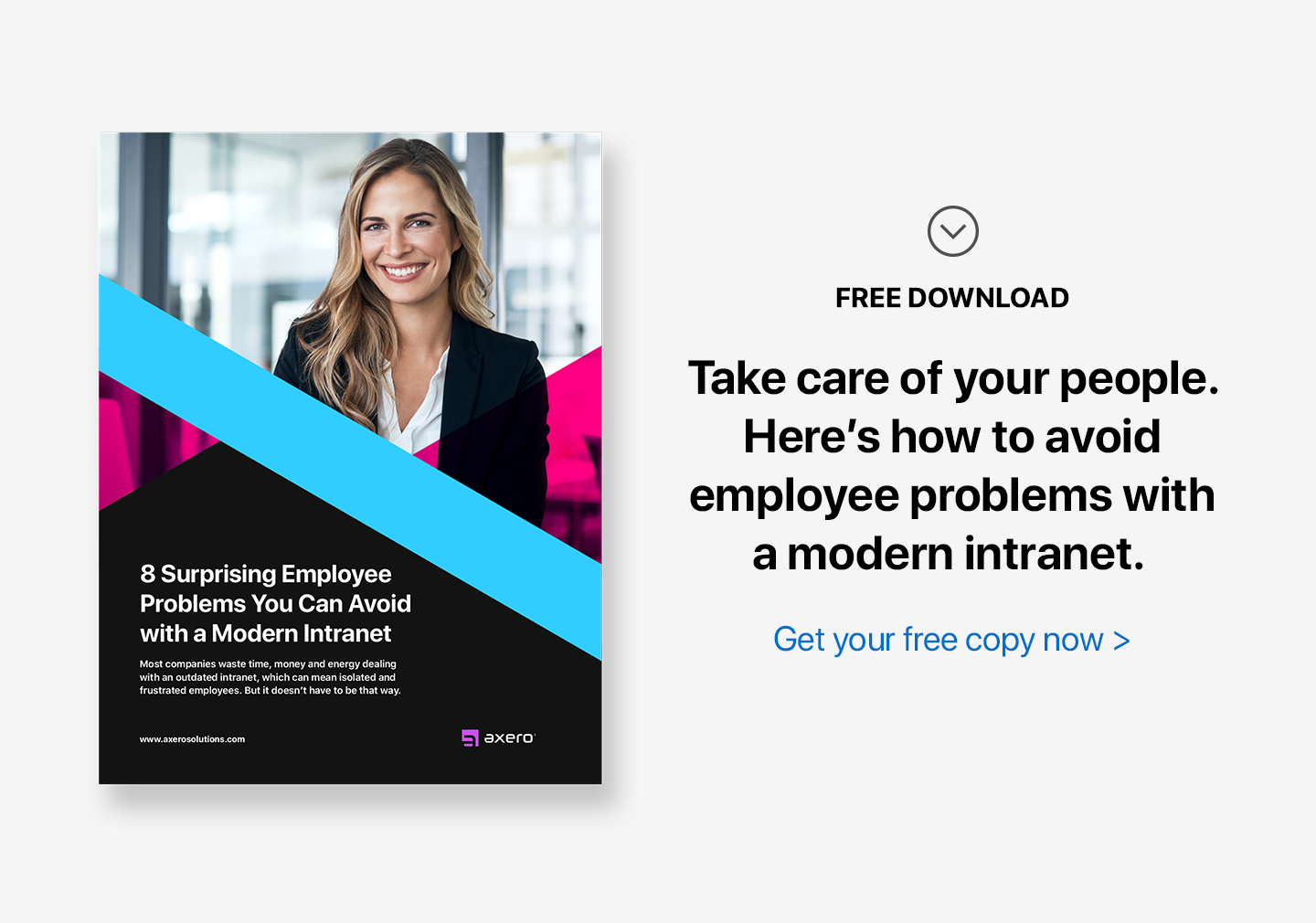In a recent post, “What’s Eating at Your People? Could It Be These Ten Biggest Workplace Stressors?”, we looked at common causes of stress for Americans at work. “Unreasonable workload” came in at #3. Twelve percent of those polled said it stressed them the most.
The percentage was higher among employees with college degrees and those earning more than $50,000 per household per year. Unreasonable workload and poor work-life balance were the top stressors for this group. If you’re reading this post, chances are this includes you and your direct reports. It will certainly ring true for many of mine.
Take as much comfort as you can in the fact that you’re not alone. There’s no such thing as a “reasonable workload” for a growing business, just ask anyone at Axero. Slumping businesses don’t get a break either. When competition is stiff and margins are slim, companies try to do more with less.
You cannot eliminate the workload, but you can reduce the stress. Here’s how.
Workload is in the Eye of the Beholder
Train your people to be strategic and precise about what needs to be done first. We all have lists, but the list can’t run your day. The list will always be there, and, in a sense, it’s not that important. No matter how long or complicated, the list is only a small part of your job. Your main responsibility is processing new information as it becomes available and making judgments about the best use of your time. Notice how the biggest boss always has the cleanest desk—and some of us get so good at it, we don’t have a desk at all.
Spot the Drama Queen
Let’s say you have two employees. Both are talented and qualified. Both have mission-critical jobs with an unlimited workload. One employee takes pride in the challenge, and the other is always complaining. Not only is the workload unreasonable, but the customers are ridiculous, the process is insane, and the new employee you hired to lighten his load is unreliable and not good at what he does.
Ouch! Why such a difference?
Some of it goes back to innate psychological traits, childhood trauma, and other such fascinating concepts. Giant corporations, like Google and Walmart, hire behavioral scientists to sort out winning qualities in job candidates and employees. But there’s help for the little guy, too. Axero retained a recruiting firm to put candidates through structured behavioral interviews. The founder claims his technique works better than Google’s. The bar for our new hires just went up. Fingers crossed, no more drama queens for Axero.
Become a Better Coach
You probably noticed that the longer you work with people, the less you manage them and the more you become a therapist and a coach. Not just to your employees, but to your customers and suppliers too.
You might even wonder if that’s all there is to running a business. It is a big part of running mine, and it’s the biggest lever I have to manage my workload. If you’ve done a good job picking your hires, it’s not so much about telling them what to do, as it is about reframing their thinking.
Nine out of every ten problems people bring to me are not really problems. The pace seems chaotic because we’re covering new territory, but we’re doing fine. Bugs are holding up the release, but we’re 95 percent there. Customers hit the panic button, but you don’t need to go there with them. Stay calm and restate the problem; chances are, they have everything they need to solve it on their own.
How do I make people see what I see? It’s an interesting psychological exercise. It takes some know-how, and you get better as you go. There’s always plenty of room to practice, so you get good fast. For an added advantage, read up on basic psychology and communication techniques. The two books that got me started are Robert Cialdini’s Influence and Chris Voss’ Never Split The Difference.
Stop. Change, Start.
Just one hairy project can make you feel unreasonably overworked. Don’t spin your wheels and don’t carry your frustration with one project to the next. Take the time to check in with yourself as you change tasks and make a fresh start. Not only will this make you more productive, but you will enjoy your accomplishments more and be less likely to stress over your shortcomings.
Make It Worthwhile
When people love their jobs and like working together, the unreasonable workload becomes a bonding ritual. Always look for ways to make the job rewarding and fulfilling for yourself and your employees. What can you do to spark their interest, inspire them, thank them, or set them free?
At Axero, we’re especially good at sharing knowledge and helping each other learn. People don’t mind working hard if they feel they’re getting somewhere. Mastering their jobs, learning new skills, and building a career are even more important than pay and benefits.
Manage Your Boss
If someone else assigns your tasks and sets your priorities, make it easy for him or her to be reasonable. Show your boss everything you’re working on and ask which project he wants first. Be honest about your abilities. Most bosses will rather give you more time or resources upfront than have you fail at the last moment.
The workload is to be negotiated between the employee and the manager. It’s an ever-changing scenario. Keep an open mind about what needs to be done when and how. Don’t be afraid of your workload. Don’t judge your progress by yesterday’s goals. Question and juggle your list every day.
Sometimes you will feel overwhelmed. Watch how you react to those thoughts. Allow yourself to confirm them, and they will follow you from project to project, from job to job, and create your reality. Choose to react responsibly and train those around you to do the same. Our best weapon against unreasonable workload is being as reasonable, rational, and disciplined as we can.
_____
If you like to bring reason into your work, you might like my book, because it arms you with facts and techniques.












 info@axerosolutions.com
info@axerosolutions.com 1-855-AXERO-55
1-855-AXERO-55


